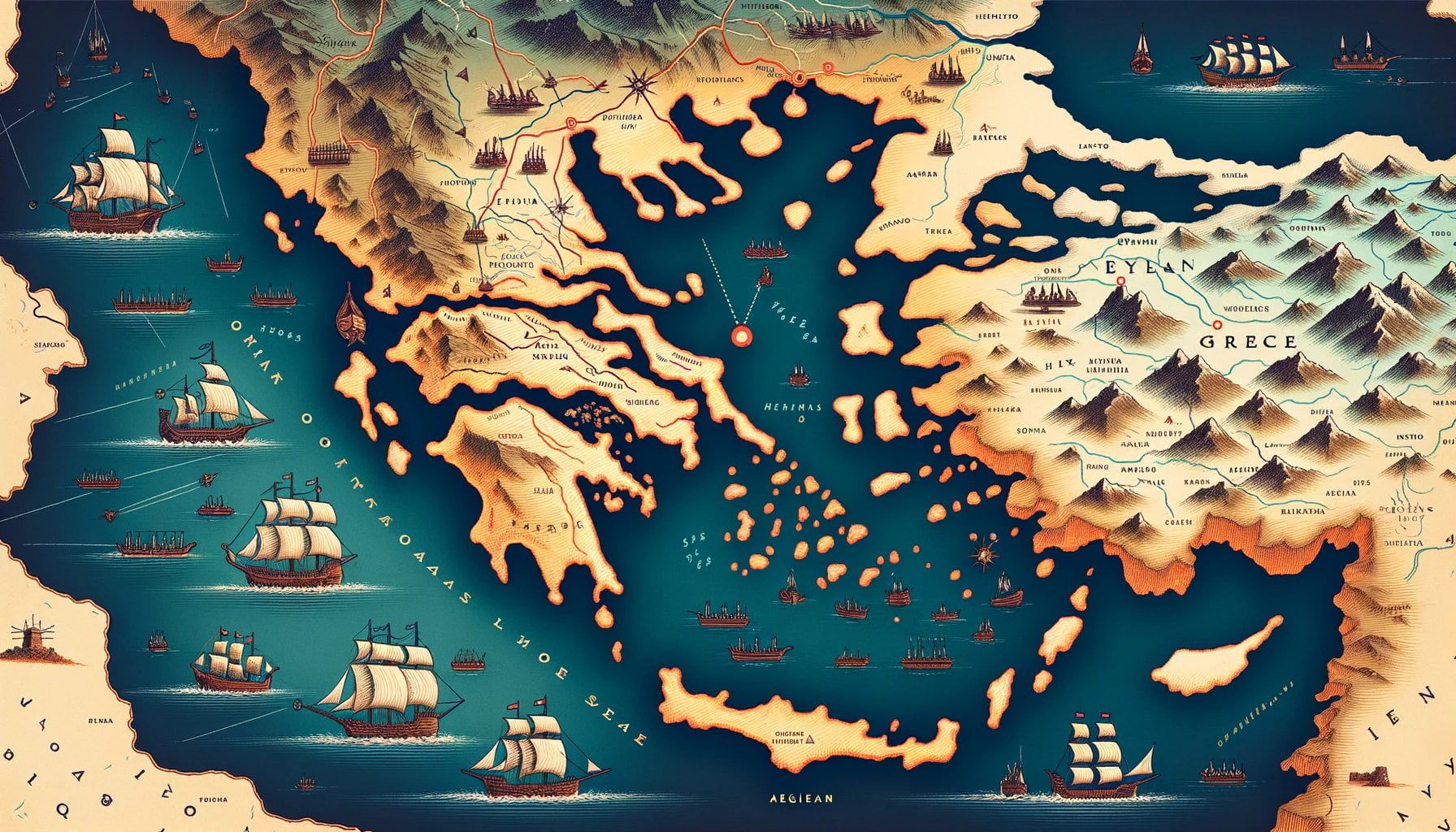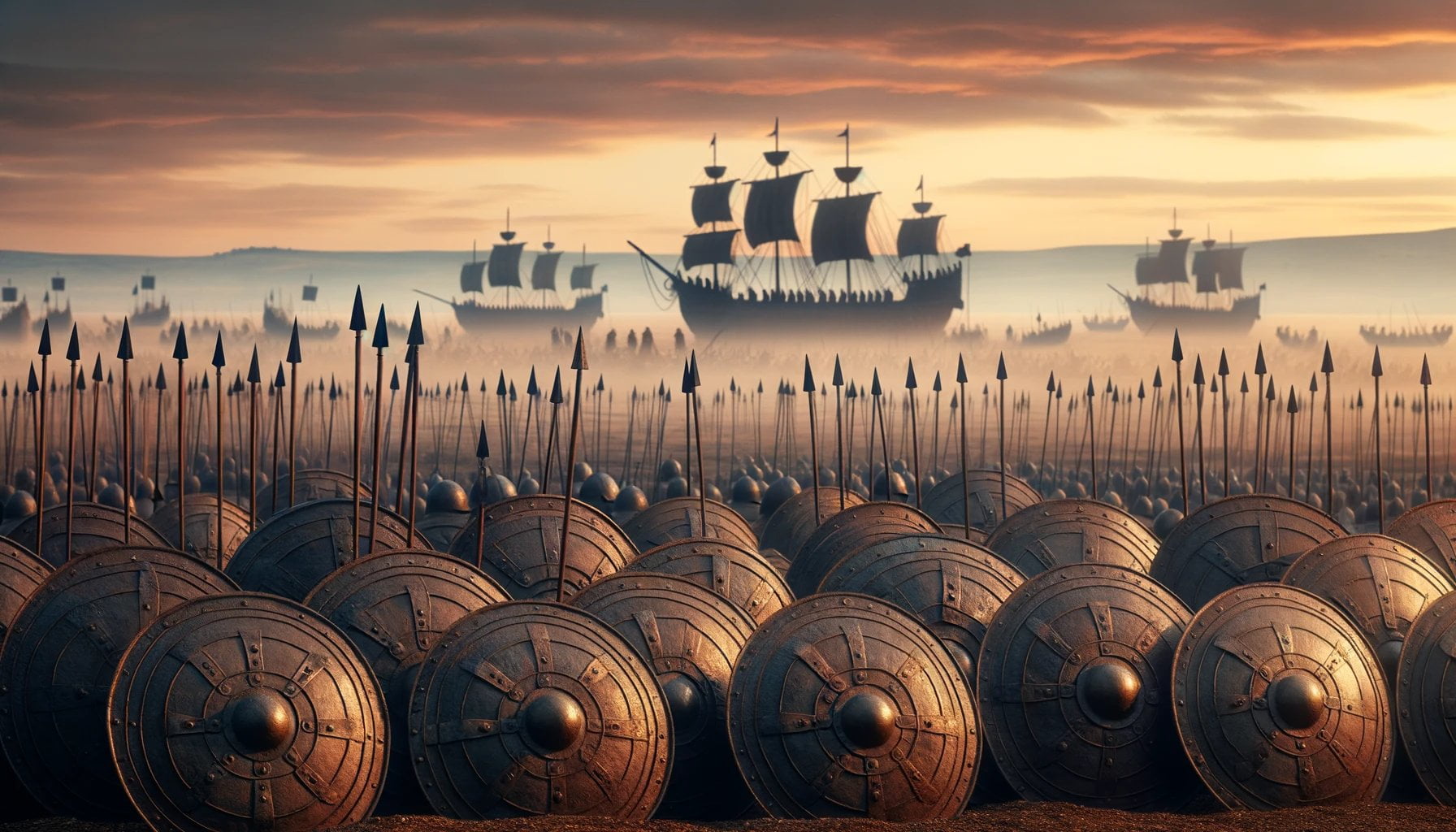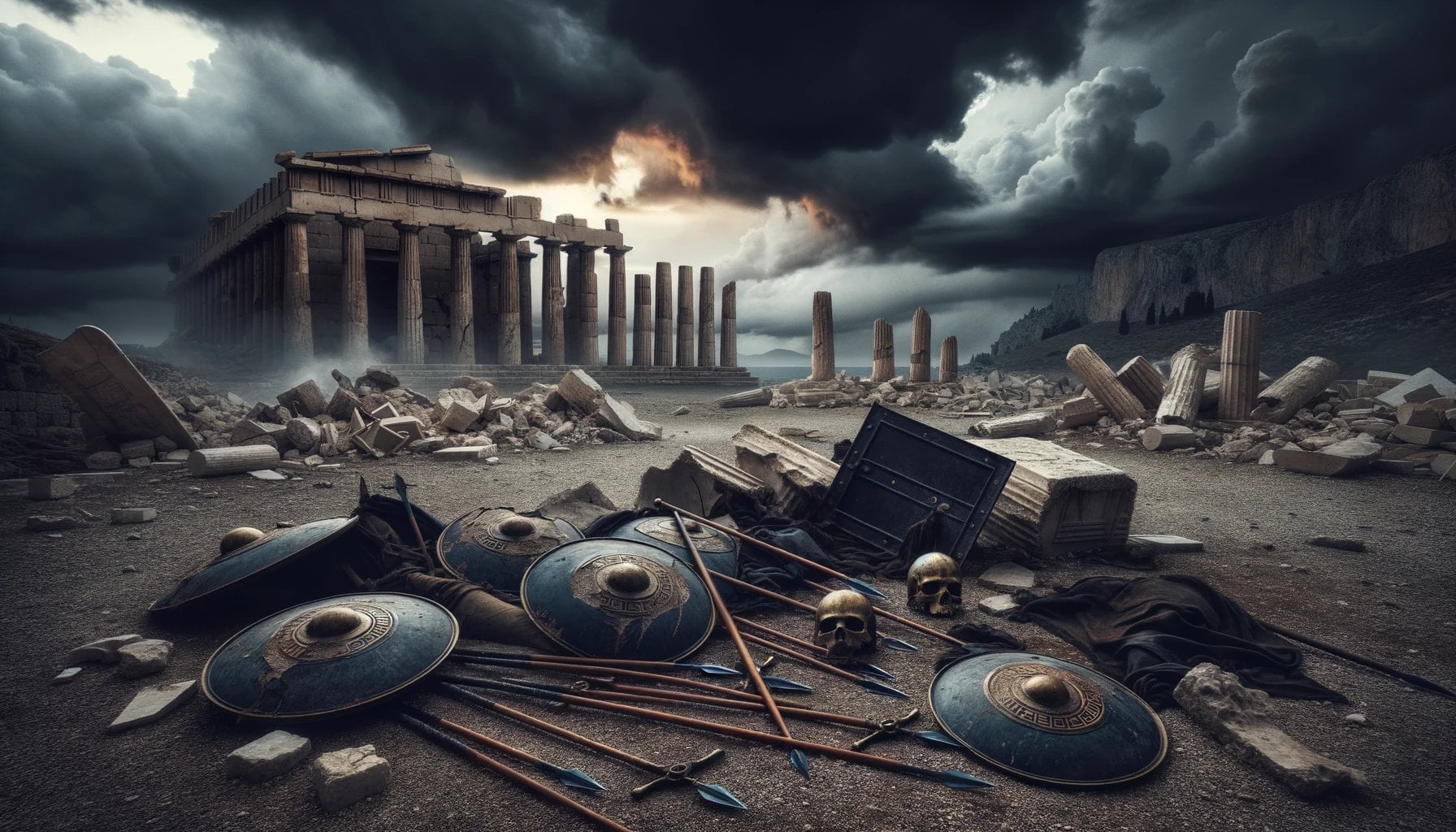Step back in time and embark on a captivating journey to uncover the enigmatic opponent that clashed with the mighty civilization of Ancient Greece. In this article, we delve deep into the mysterious depths of history to shed light on the formidable adversary that challenged the Greeks. With a meticulous analysis of their military prowess, political strategies, and unique cultural dynamics, we unveil the intricate interplay between this ancient foe and the vibrant society of the Greeks. Prepare to be enlightened as we unravel the secrets of this ancient adversary and gain a profound understanding of their impact on the great Ancient Greek civilization.
Key Takeaways:
- The Persian Empire, under King Darius I, was a formidable enemy of Ancient Greece and invaded in 490 BCE. The Athenians emerged victorious in the Battle of Marathon, showcasing the resilience of Greek military forces.
- Sparta, one of the leading city-states in Greece, was a major adversary of Athens during the Peloponnesian War (431-404 BC), eventually emerging as the victor after the Battle of Aegospotami.
- Internal conflicts, such as the Peloponnesian Wars, plagued Ancient Greece, pitting Athens against Sparta and resulting in protracted and devastating conflicts.
- Ancient Greece formed alliances, like during the Battle of Chaironeia, to counter external threats, highlighting the importance of unity against common enemies.
- Ancient Greek warfare relied heavily on hoplites, citizen-soldiers who served as spearmen and fought in organized formations called phalanxes, utilizing shields and long spears.
- The conflicts and wars with their adversaries significantly shaped Greek society and military tactics, demonstrating the resilience and ingenuity of Ancient Greece.
Unveiling the Ancient Adversary: Discovering the Enemy of Ancient Greece

Ancient Greece, renowned for its extraordinary contributions to civilization, had its fair share of adversaries throughout its illustrious history. The struggles and conflicts that arose from these rivalries played a pivotal role in shaping the Greek society and military tactics that we recognize today. In this article, we will explore some of the notable enemies of Ancient Greece, from the formidable Persian Empire to the fierce city-state of Sparta.
The Persian Empire: A Mighty Foe
One of the most renowned foes of Ancient Greece was the Persian Empire, which made its mark on history in the 5th century BCE. Under the rule of King Darius I, the Persians embarked on an ambitious invasion of Greece in 490 BCE. This audacious attempt to conquer Greece led to the momentous Battle of Marathon, where the Athenians, with their indomitable spirit, emerged victorious and bravely repelled the Persians. This triumph not only fortified the Greek resolve but also showcased the resilience and tactical prowess of the Greek military forces.
Sparta: A Rivalry Born of Power
Sparta, one of the leading city-states in Greece, was a fierce adversary of Athens during the tumultuous Peloponnesian War that spanned from 431-404 BC. This protracted conflict was dominated by the relentless struggle for power between these two prominent city-states. Eventually, Sparta emerged triumphant after the pivotal Battle of Aegospotami, solidifying their status as the principal enemy of Athens. This epic duel between Athens and Sparta demonstrated the intense rivalry and the lengths to which the ancient Greeks were willing to go to protect their interests.
Internal Strife: Wars within Greece
In addition to external foes, Ancient Greece experienced significant internal strife, with wars and conflicts erupting among various states and factions. The Peloponnesian Wars, spanning from 459-446 BC and 431-404 BC, were noteworthy instances of this internal turmoil. These wars showcased the power struggle between Athens and its allies against Sparta and its allies, resulting in a long and devastating conflict that left an indelible mark on the history of Ancient Greece.
Uniting Against Common Enemies
Facing external threats, Ancient Greece often came together, forming alliances to counter their adversaries. The Battle of Chaironeia serves as a poignant reminder of this unity. In this significant event, the allied forces of Athens, Thebes, and Corinth faced defeat at the hands of Philip of Macedonia, underscoring the importance of Greek city-states standing together against common foes. This united front against external enemies echoed the resourceful spirit and intelligence of the ancient Greeks.
Military Tactics: The Backbone of Defense
Ancient Greek warfare was renowned for its formidable military tactics, with hoplites, the citizen-soldiers of the city-states, at the forefront of Greek military might. These hoplites served as spearmen in organized formations known as phalanxes, employing shields and long spears to devastating effect. The phalanx formation became synonymous with Ancient Greek military strategy, embodying the discipline and unity that allowed the Greeks to stand firm against their adversaries.
In conclusion, Ancient Greece encountered numerous enemies throughout its rich history, ranging from the mighty Persian Empire to the formidable city-state of Sparta. The conflicts and wars that ensued from these adversarial relationships shaped not only the course of Greek history but also their society and military tactics. By delving into these historical events, we gain a profound appreciation of the resilience, ingenuity, and unwavering spirit of the ancient Greeks in the face of formidable foes.
Sources:
[^1^]: History Disclosure: Who Were Ancient Greece Enemies?
[^2^]: Wikipedia: Ancient Greek Warfare
[^3^]: Wordplays: Enemy of Ancient Greece Crossword Clue
[^4^]: Oxford Academic: War and Warfare in Ancient Greece
[^5^]: World History Encyclopedia: Ancient Greek Warfare
[^6^]: BBC Bitesize: The Ancient Greeks at War
Here are some active internal links for you:
- Famous Females in Ancient Greece – Discover the incredible accomplishments and stories of the famous females who left their mark on ancient Greece.
- Priestesses in Ancient Greece – Uncover the fascinating role and rituals of priestesses in ancient Greece, and how they played a significant part in religious practices.
- Queens in Ancient Greece – Delve into the lives of powerful queens who ruled in ancient Greece and learn about their influence on politics and society.
- Kings of Ancient Greece – Learn about the legendary kings who held the highest positions of power in ancient Greece and shaped its history.
- Transportation in Ancient Greece – Explore the various means of transportation utilized in ancient Greece and how they enabled trade, communication, and cultural exchange.
- Aristocracy in Ancient Greece – Gain insights into the aristocratic class of ancient Greece and their privileged position in society, as well as their impact on governance.
- Do You Capitalize Ancient Greece? – Find out whether you should capitalize the term “Ancient Greece” and understand the proper usage in written communication.
These active internal links will lead you to more in-depth information on each topic. Happy exploring!
Political and Diplomatic Interactions with Ancient Greece
Ancient Greece, renowned for its rich history and cultural achievements, was not without its fair share of political and diplomatic encounters with other civilizations. These interactions shaped the course of Greek society, influencing their military strategies, political ideologies, and cultural perspectives. Through a comprehensive analysis of these engagements, we can gain a deeper understanding of the formidable adversaries that challenged the ancient Greeks.
The Significance of Ancient Greek Diplomacy
Ancient Greek diplomacy held a unique place in the history of diplomacy as we know it today. It can be traced back to the Archaic period, which predates Roman statecraft. Compared to the cosmopolitanism of the Persian Empire, Greek diplomacy seemed provincial and unpolished, with rudimentary practices. However, it laid the foundation for later developments in diplomatic strategies and international relations.
To truly grasp ancient Greek diplomacy, we must explore the social and cultural realms of this civilization. The mythology, which was an integral part of Greek society, played a role in shaping their diplomatic processes. Moreover, examining the three distinct periods of ancient Greek history – the Archaic, Classical, and Hellenistic periods – provides crucial insights into the evolution of their diplomatic practices over time.
Understanding the Key Aspects of Ancient Greek Diplomacy
Delving into the political thought and experimentation of Ancient Greece helps us comprehend the dynamics of their diplomatic engagements. The emergence of the first serious political thinkers fueled the interaction between political thought and practice in Greek society. Democracy in Ancient Greece evolved through the battle of ideas and politically motivated exercises of power. It sought to gain the trust and support of the voting population, highlighting the significance of diplomacy in this ancient civilization.
Secret decision-making processes were not uncommon in the ancient world, further emphasizing the importance of diplomacy. In-depth research and analysis of Ancient Greek diplomatic practices shed light on the behind-the-scenes dynamics of the ancient world. It allows us to grasp the subtle intricacies of political alliances, negotiations, and power struggles that shaped Greek history.
Key Takeaways:
- Ancient Greek diplomacy played a crucial role in shaping their military strategies, political ideologies, and cultural perspectives.
- It predates Roman statecraft, making it a significant historical precursor to later diplomatic developments.
- Mythology and cultural realms influenced the diplomatic processes of the ancient Greeks.
- Three distinct periods – the Archaic, Classical, and Hellenistic – provide insights into the evolution of diplomatic practices.
- Experimentation and innovation in Greece fueled the emergence of political thinkers, resulting in the dynamic interaction between political thought and practice.
- Ancient Greek diplomacy emphasized the battle of ideas and politically motivated exercises of power.
- In-depth research into ancient Greek diplomatic practices reveals the secret decision-making processes of antiquity.
Sources:
1. Pretzler, Maria. The Diplomacy of Ancient Greece: A Short Introduction. diplomacy.edu.
2. Buckler, John. The Development of Ancient Greek Diplomacy. JSTOR.
Note: This article provides a glimpse into ancient Greek diplomacy, based on the provided context. For a comprehensive understanding, additional sources and perspectives should be consulted.
Impact of the Enemy on Ancient Greek Society and Culture
Throughout ancient Greek history, various enemies emerged that significantly influenced Greek society and culture. These adversaries played a crucial role in shaping Greek military tactics, political strategies, and cultural perspectives. In this article, we will delve into the impact of these formidable foes on ancient Greek civilization, shedding light on the intricate interplay between their society and that of the Greeks.
The Persian Threat: Challenging Greek Independence
One of the most notable enemies of ancient Greece was the mighty Persian Empire. Under the rule of King Darius I, the Persians launched an invasion of Greece in 490 BCE. The Persians sought to expand their empire and subjugate the fiercely independent Greek city-states. However, the Athenians rose to the occasion and emerged victorious in the Battle of Marathon, showcasing the military prowess of the Greeks. This triumph not only bolstered Greek confidence but also emphasized the significance of their democratic values and system of governance.
Uniting Against a Common Foe
Internal conflicts and rivalries within Greece, such as the Peloponnesian Wars between Athens and Sparta, often took center stage in shaping Greek history. However, these rivalries were set aside when faced with a common enemy. Ancient Greek society recognized the importance of unity as a means of survival and protection against outside threats. The Persian Wars, for instance, led to a temporary alliance between various Greek city-states, ultimately resulting in the defeat of the Persian invaders. This unity further solidified the Greek identity and nurtured a sense of shared culture and heritage.
Transforming Warfare and Creating a Legacy
The encounters with formidable enemies like the Persians had a profound impact on ancient Greek warfare. The Greco-Persian Wars, in particular, showcased the strategic brilliance and resilience of the Greeks. They developed formidable military tactics, such as the use of hoplites in phalanx formations, which became the hallmark of Greek warfare. These tactics, coupled with the Greek’s unwavering spirit, ingenuity, and adaptability, set the stage for future military endeavors and left a lasting legacy on the art of war.
Cultural Exchange and Influence
The encounters with their enemies also facilitated cultural exchange and shaped Greek culture. Ancient Greece, with its hundreds of independent city-states, served as a cultural crossroads. The Persian Empire, despite being the adversary, exposed the Greeks to new ideas, customs, and traditions. This cultural exchange ignited a spark of creativity within the Greeks, leading to artistic and philosophical developments that would influence Western culture for centuries to come.
Key Takeaways:
- The Persian Empire posed a significant threat to ancient Greece, but the Greeks successfully defended their independence and democratic values.
- Internal conflicts and rivalries were temporarily set aside when faced with a common enemy, highlighting the importance of unity in ancient Greek society.
- The encounters with formidable enemies like the Persians transformed Greek warfare, leading to the development of innovative military tactics and a lasting legacy on the art of war.
- Despite being adversaries, the cultural exchange between the Greeks and their enemies, such as the Persians, sparked artistic and philosophical developments that had a profound influence on Western culture.
Sources:
– Britannica: Ancient Greek civilization | History, Map, Culture, Politics, Religion
– World History Encyclopedia: Ancient Greek Society
Legacy and Lasting Influence of the Enemy on Greek History
The legacy of ancient Greece continues to shape our world today. From its contributions to philosophy, politics, art, and architecture to its impact on language, science, and religion, the ancient Greeks left a lasting legacy that has influenced the development of Western civilization.
One aspect of ancient Greece that is often overlooked is the significant role played by their enemies in shaping Greek society, military tactics, and cultural perspectives. These formidable adversaries challenged the ancient Greeks and left a lasting impact on their history.
The Impact of Adversaries
The Persian Empire: One of the most notable enemies of ancient Greece was the Persian Empire, led by King Darius I. In 490 BCE, the Persians invaded Greece, but the Athenians emerged victorious in the Battle of Marathon, showcasing Greek military prowess. This victory not only defended Greek independence but also solidified their democratic values, emphasizing the importance of freedom and self-governance.
Internal Conflicts: The rivalries within Greece, such as the Peloponnesian Wars, had a significant impact on Greek history. Athens and Sparta, two prominent city-states, engaged in fierce battles during the Peloponnesian War, with Sparta eventually emerging as the victor. These internal conflicts highlighted the importance of unity in Greek society and the consequences of division.
Cultural Exchange and Influence: Despite the adversarial nature of these encounters, the cultural exchange with their enemies, such as the Persians, sparked artistic and philosophical developments that had a lasting influence on Western culture. Ideas, beliefs, and artistic styles were shared, resulting in a rich and diverse cultural tapestry that transcended borders.
The Legacy and Lasting Influence
The legacy and lasting influence of these enemies on Greek history cannot be underestimated. They pushed the ancient Greeks to innovate and develop formidable military tactics, such as the phalanx formations used by hoplites. These tactics were influenced by encounters with powerful adversaries and shaped the course of warfare in ancient Greece.
Moreover, the encounters with adversaries like the Persians not only transformed Greek warfare but also led to the development of innovative military strategies and political ideologies. Diplomatic practices evolved, laying the foundation for later developments in diplomatic strategies and international relations. The battle of ideas and politically motivated exercises of power became cornerstones of ancient Greek diplomacy.
Key Takeaways:
- The enemies of ancient Greece, particularly the Persian Empire, had a profound impact on Greek history.
- Internal conflicts within Greece, such as the Peloponnesian Wars, also shaped the course of Greek civilization.
- The cultural exchange with adversaries influenced artistic and philosophical developments with lasting influences on Western culture.
- Adversaries forced the ancient Greeks to develop innovative military tactics, such as the phalanx formations used by hoplites.
- Encounters with formidable enemies transformed Greek warfare and led to the emergence of diplomatic practices that laid the foundation for later developments in international relations.
Sources:

FAQ
Q1: Who were the enemies of Ancient Greece?
A1: The enemies of Ancient Greece included the Persian Empire, Sparta, and various states and factions within Greece itself.
Q2: What was the significance of the Battle of Marathon?
A2: The Battle of Marathon, where the Athenians defeated the Persians, marked a significant victory for Greece and showcased the resilience of its military forces.
Q3: What was the Peloponnesian War?
A3: The Peloponnesian War was a lengthy conflict between Athens and Sparta, with Sparta emerging as the principal enemy of Athens. It had a protracted and devastating impact on ancient Greek society.
Q4: How did Ancient Greek city-states unite against common enemies?
A4: Ancient Greek city-states formed alliances, such as the one in the Battle of Chaironeia, to counter external threats and emphasize the need for unity against common enemies.
Q5: What role did hoplites play in Ancient Greek warfare?
A5: Hoplites, citizen-soldiers of the Ancient Greek city-states, served as the backbone of the Greek army. They fought in organized formations called phalanxes and played an instrumental role in battle.
“`json
“`
















